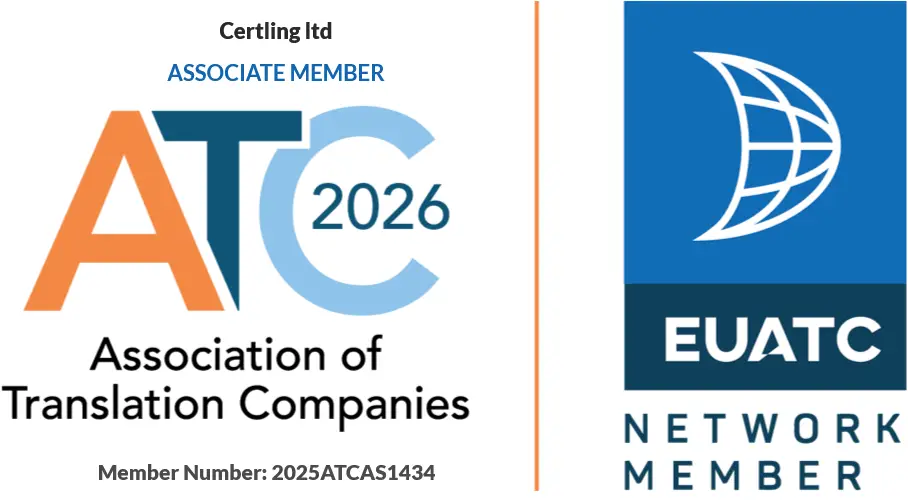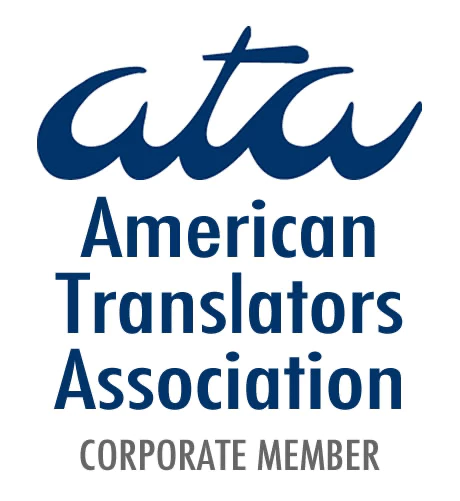Translation Requirements for USCIS
Getting a certified translation for the USCIS could not be easier with Certling!
Complete Translation
Every element of the document must be translated, including seals, signatures, and notations. Any omissions or inaccuracies could lead to delays or requests for additional evidence.
Certificate of Translation Accuracy
The translator must include a certification confirming the translation is complete and accurate, along with their name, signature, date, and contact information.
Work with Professional Translators
Choose a professional translator or agency that is a member of a recognized body such as the Association of Translation Companies (ATC) or American Translators Association (ATA).
Data Protection
At Certling, we prioritize your privacy. All documents are purged from our servers two weeks after delivery to ensure data security.
According to 8 CFR 103.2(b)(3), “Any document containing foreign language submitted to USCIS shall be accompanied by a full English language translation which the translator has certified as complete and accurate, and by the translator's certification that he or she is competent to translate from the foreign language into English.”
Does USCIS Require a Notarized Translation?
For most documents, USCIS does not require notarized translations. The certification statement confirming the translation’s accuracy and the translator’s competence is typically sufficient. However, certain legal documents, such as court or prison records, may require notarization (Source). Check with the specific agency handling your case for exact requirements.
Accuracy and Completeness in Translations
Accuracy and completeness are paramount when translating documents for USCIS. Any discrepancies or missing details can lead to application delays or even denials. Translations must replicate every detail of the original document, including seals, signatures, and notations. This thoroughness helps ensure that your documents meet USCIS expectations and demonstrates the legitimacy of your application.
Common Mistakes in USCIS Translations
Some frequent errors include:
- Partial Translations: Missing elements such as signatures or stamps can lead to rejections.
- Poor Quality or Inaccurate Language: Misinterpretations that alter the document’s meaning jeopardize your application.
- Uncertified Translations: Submitting translations without a certification often results in immediate rejections.
Selecting a professional, experienced translation service avoids these pitfalls and ensures that your application proceeds without unnecessary obstacles.
Certified Translation Services
Choosing the right certified translation service for your USCIS application can make all the difference. At Certling, we specialize in high-quality certified translations that meet USCIS standards.
-
Certified Translations Accepted in the USA
Each translation includes a certification letter with all required details for official acceptance. -
Transparent Per-Word Pricing
Receive an instant quote based on word count—you pay only for what you need. -
Fast Turnaround Times
Efficient service without compromising on quality. -
Strict Data Security
We prioritize your privacy, holding your data only as long as necessary to deliver our services. -
Simple, User-Friendly Platform
Upload photos or scans easily, with an intuitive interface from start to finish.
Role of Professional Translators
The role of professional translators in USCIS document preparation cannot be overstated. While it may seem sufficient to rely on someone who is bilingual, professional translation demands far more expertise. Professional translators typically have formal training in linguistics and translation methodologies, ensuring accuracy and completeness for every detail.
This expertise also brings invaluable insights into cultural nuances and appropriate local equivalents. Such context can be crucial for helping USCIS officials fully understand your documents, minimizing potential misunderstandings or requests for additional evidence.
Documents We Translate
Whatever your needs, we provide certified translations for a wide range of documents.
Court Ruling
Identity Documents
Tax Return
+ Many more
How to Get Certified Translation with Certling
Step 1
Prepare Your Documents
Scan or take clear photos of the documents.
Step 3
Review the Preview
Adjust orientation if needed to ensure your documents appear correctly.
Step 4
Customize (Optional)
Remove unnecessary parts of the document if you don’t need them translated.
Step 5
Checkout & Payment
Select turnaround time, hard copies, and finalize your order. Get transparent, per-word pricing.
Step 6
Request Amendments
You have 14 days to request corrections, especially for handwritten content.
B-1 Visitor Visa
The B-1/B-2 visitor visa is a non-immigrant visa allowing foreign nationals to travel temporarily to the United States for business (B-1), tourism (B-2), or both. It is one of the most common visas for short-term stays and is typically valid for up to 10 years with a maximum stay of 180 days per entry. View our guide here.
K-1 Fiancé(e) Visa
The K-1 visa is for U.S. citizens who want to bring their foreign partner to the United States to get married. It requires meeting certain conditions within 90 days of entry, and involves detailed paperwork, an interview, and possibly certified translations. Certling is here to help with any documents you need translated. Visit our in-depth K-1 visa guide here for a step-by-step breakdown of the entire process.
USCIS Forms
Read more on each form:
- Form I-130 – Petition for Alien Relative
- Form I-130A – Supplemental Information for Spouse Beneficiary
- Form I-131 – Application for Travel Document
- Form N-400 – Application for Naturalization
- Form I-485 – Application to Adjust Status
- Form I-864 – Affidavit of Support
- Form I-129F – Petition for Alien Fiancé(e)
- Form I-90 – Application to Replace Permanent Resident Card
- Form DS-260 and DS-261 – Immigrant Visa Application
- Form I-765 – Application for Employment Authorization
- Form I-134A – Request to Be a Supporter and Declaration of Financial Support
With Certling, your documents will be translated accurately, securely, and in full compliance with USCIS standards. Start your certified translation today!
If you have any questions, click on the chat button at the bottom right of your screen.

